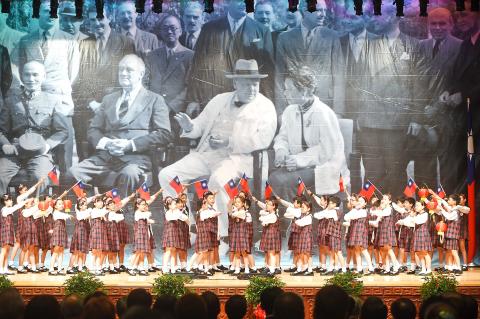President Ma Ying-jeou’s (馬英九) commemoration of the 70th anniversary of Retrocession Day yesterday betrayed a hidden China-centric and pro-unification agenda, academics said at a forum in Taipei.
The forum, hosted by the Taiwan Association of University Professors, was aimed at challenging the official “liberation” narrative of Taiwan’s post-World War II history.
“‘Liberation’ is the shackling of the Taiwanese by a military junta led by Chiang Kai-shek (蔣介石); a shackling that is still in evidence 70 years later,” association secretary-general Hsu Wen-tang (許文堂) said. “It is a liberation that never was.”

Photo: Chien Jung-fong, Taipei Times
“The political subtext of the liberation anniversary is unification,” Taiwan Thinktank deputy executive director Lai I-chung (賴怡忠) said.
The Chinese Nationalist Party (KMT) government and the Chinese Communist Party (CCP) have “already arrived at a consensus” over a roadmap toward political unification in negotiations carried out “in the past one to two years,” Lai said, adding that then-Mainland Affairs Council minister Wang Yu-chi’s (王郁琦) meeting with Taiwan Affairs Office Minister Zhang Zhijun (張志軍) last year was designed to facilitate Ma’s hoped-for meeting with Chinese President Xi Jinping (習近平) at the APEC summit, in Beijing.
This process would have led to the “official declaration of a KMT-CCP truce” on the 70th anniversary of Taiwan’s liberation this year, which would have paved the way for political unification with China had the Sunflower movement in March and April last year not “reversed the pro-China trend,” Lai said.
“If not for the Mar. 18 [protests], what events would have taken place between then and now?” Lai asked.
Another panelist, Black Island National Youth Front activist Lai Pin-yu (賴品妤), said she respects the views of KMT military veterans, but their views should not take precedence over that of other Taiwanese ethnic groups, including “Aborigines, recent immigrants and ethnic Taiwanese who were living in Taiwan prior to the KMT’s flight from China.”
“Taiwanese should question the Ma administration’s lavish promotion of ‘Taiwan’s liberation’ as a historical narrative, and its celebration of that perspective as the official position of the government,” she said.
“This event highlights how the KMT-run education system persistently and chronically excluded other cultural values and perspectives from its historical perspectives, and employed crude militarism in an attempt to impose on Taiwanese the narrative of a ‘Liberation in the War of Resistance,’” Lai Pin-yu said.

A preclearance service to facilitate entry for people traveling to select airports in Japan would be available from Thursday next week to Feb. 25 at Taiwan Taoyuan International Airport, Taoyuan International Airport Corp (TIAC) said on Tuesday. The service was first made available to Taiwanese travelers throughout the winter vacation of 2024 and during the Lunar New Year holiday. In addition to flights to the Japanese cities of Hakodate, Asahikawa, Akita, Sendai, Niigata, Okayama, Takamatsu, Kumamoto and Kagoshima, the service would be available to travelers to Kobe and Oita. The service can be accessed by passengers of 15 flight routes operated by

Alain Robert, known as the "French Spider-Man," praised Alex Honnold as exceptionally well-prepared after the US climber completed a free solo ascent of Taipei 101 yesterday. Robert said Honnold's ascent of the 508m-tall skyscraper in just more than one-and-a-half hours without using safety ropes or equipment was a remarkable achievement. "This is my life," he said in an interview conducted in French, adding that he liked the feeling of being "on the edge of danger." The 63-year-old Frenchman climbed Taipei 101 using ropes in December 2004, taking about four hours to reach the top. On a one-to-10 scale of difficulty, Robert said Taipei 101

Taiwanese and US defense groups are collaborating to introduce deployable, semi-autonomous manufacturing systems for drones and components in a boost to the nation’s supply chain resilience. Taiwan’s G-Tech Optroelectronics Corp subsidiary GTOC and the US’ Aerkomm Inc on Friday announced an agreement with fellow US-based Firestorm Lab to adopt the latter’s xCell, a technology featuring 3D printers fitted in 6.1m container units. The systems enable aerial platforms and parts to be produced in high volumes from dispersed nodes capable of rapid redeployment, to minimize the risk of enemy strikes and to meet field requirements, they said. Firestorm chief technology officer Ian Muceus said

MORE FALL: An investigation into one of Xi’s key cronies, part of a broader ‘anti-corruption’ drive, indicates that he might have a deep distrust in the military, an expert said China’s latest military purge underscores systemic risks in its shift from collective leadership to sole rule under Chinese President Xi Jinping (習近平), and could disrupt its chain of command and military capabilities, a national security official said yesterday. If decisionmaking within the Chinese Communist Party has become “irrational” under one-man rule, the Taiwan Strait and the regional situation must be approached with extreme caution, given unforeseen risks, they added. The anonymous official made the remarks as China’s Central Military Commission Vice Chairman Zhang Youxia (張又俠) and Joint Staff Department Chief of Staff Liu Zhenli (劉振立) were reportedly being investigated for suspected “serious